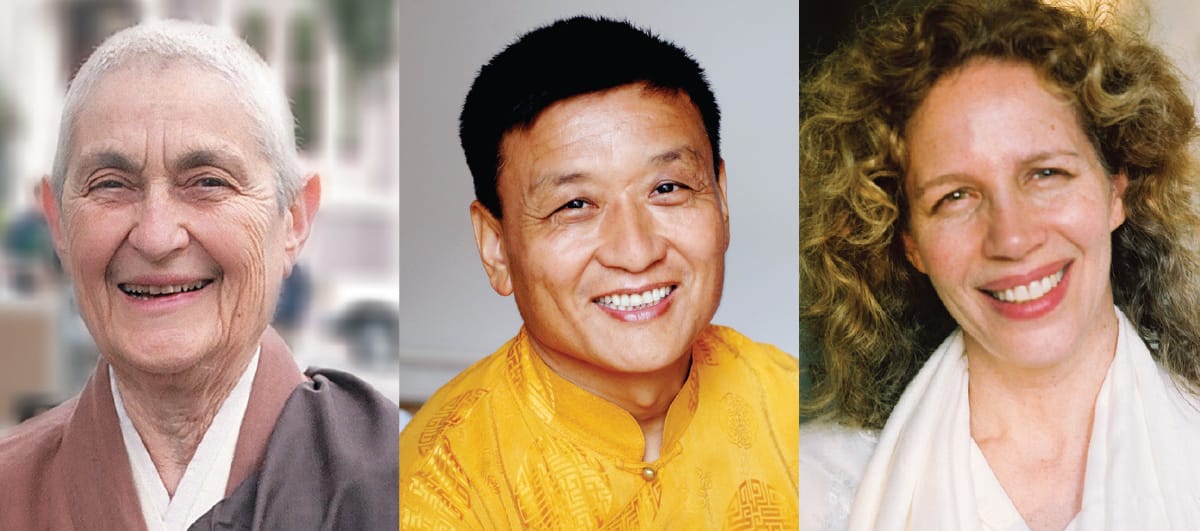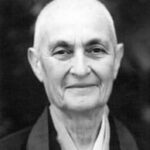Question: My teacher died twenty-two years ago. Since then I have maintained my connection to the sangha and still practice in the Tibetan Buddhist tradition. But that’s only two of the three jewels. Am I doing myself and the tradition a disservice by trying to practice Buddhism without a guru? Would I be better off opting for another practice—perhaps secular mindfulness—that I can do without a teacher?
Zenkei Blanche Hartman: Certainly I think practicing the Buddha Way without a teacher is better than not practicing at all. However, you have not said anything about why you want to practice without a teacher. Do you live in a location where there are no teachers available? Does it feel somehow disloyal to your original teacher for you to work with a new teacher? Have you asked this question of your deceased teacher in your heart during meditation?
If your circumstances are such that you are able to practice with a teacher as well as with a sangha, I would recommend doing so, whether you take up Vajrayana practice, “secular mindfulness,” Zen, or Insight practice. A teacher can be a mirror to help you see habits of clinging that may be leading you to suffering or to unwholesome actions of body, speech, and mind. Good friends in the sangha can also be supportive in this way.
Practicing with a teacher also gives you a readily available recipient toward whom you can offer your gratitude for your great good fortune of being alive and born in a precious human body and for meeting the buddhadharma in this life.
Tenzin Wangyal Rinpoche: The “three jewels” refer to the Buddha, the dharma, and the sangha. In the Tibetan Buddhist and Bön traditions, the teacher represents the Buddha, and seeing one’s teacher as Buddha is a supreme support for the student. The ability to open to the teacher and to the warmth of this connection is the ground for receiving blessings and realizing the nature of mind. Once you have practiced and shared experiences with a teacher whom you can trust and learn from and finally achieve some confidence in your own practice, the physical presence of the teacher is no longer essential to your realization.
One of the most prominent lineage masters in the Bön Dzogchen tradition taught of the three masters. The first master, the guide master, is the actual living, breathing teacher from whom you receive teachings and who introduces you to the awakened nature primordially existing within you. The second master manifests when, through the power of your meditation, your own visions and experiences point you directly to this nature; therefore, all experiences become your teacher. The third master is your direct, naked awareness or self-realization.
In respect to this particular question, the answer depends on the realization of the questioner. For the student who has deep confidence within—confidence in the knowledge received from a teacher and from the experiences that arise as a result—the physical presence of the teacher does not matter. The same presence, the same depth of connection, the same transmission, and the same support are all there within the student. If the teacher dies, there is no need to seek further guidance but only to persevere in one’s practice. Even so, if you are inspired to join another sangha and feel supported by that and other practices, it is fine. You do not lose the connection to your master, which is the foundation through which you continue to grow and mature. You don’t change the relationship to the teacher or the practice, as they are within you, but you can find support from other teachers to deepen what was taught by your main teacher.
What if your confidence has not matured sufficiently to feel the depth of connection that leads to realization? The advice would be to follow the successor of your teacher or his or her principal students, or other lineage holders or masters within that tradition. If your motivation is pure and clean, everything you learn is built upon the previous foundation. You don’t replace the foundation but rather acknowledge the foundation you are building on. Do not just go with what is in fashion at the moment; that would be sad. Sometimes in the West we have a tendency to move away from our past, looking toward the next frontier or new opportunity when we could go deeper into what we already have received and discover who we truly are.
Experiencing the loss of a teacher— whether you haven’t seen your teacher for some time or your teacher has died—is an opportunity to open more deeply into loss or imagined lack, to look nakedly within to discover that the one who is lacking has no inherent solidity. If you remain there with unwavering faith and devotion, you will realize that the jewel of your teacher’s wisdom and compassion is right there within you. That is the true purpose of guru yoga practice—to recognize the inseparability of your mind and that of your teacher, of the Buddha, right here in this very moment. As your practice continues, you achieve stability in this realization for the benefit of others.
Narayan Helen Liebenson: I will do my best to answer your question, with the understanding that I don’t know much about the Tibetan tradition and how essential being under the guidance of a living teacher is considered to be.
Given that you have continued to sustain your connection to this particular tradition for twenty-two years, I can’t see why you would need to change paths unless you want to. I do wonder what is prompting you to question your participation after all these years. Do you have an intuition that another path might be better at this point? Is there some dissatisfaction? Or a sense of being “less than,” perhaps doubting that you have permission to continue?
I don’t see any way that you might be doing yourself or the tradition a disservice. The fact that you have kept your connection going for so long without a living teacher points to your love and respect for the tradition, as well as for your teacher who has died. How can that be a bad thing?
As for your late teacher, it is said that if you have a meaningful connection while the person is alive, that connection isn’t necessarily severed at death. I have been truly surprised to find that since my beloved teacher, Master Sheng Yen, passed away in 2009, there is a way in which he is still available to me. I can’t say much more than that, but the experience has given me confidence that such relationships continue after death.
If this kind of connection is true for you on any level, then you still have access to the first jewel. If you do not feel it is true, then consider another meaning of taking refuge in the Buddha, which is taking refuge in your own buddhanature. From that perspective, you still have access to the first jewel. It is also wonderful that you are in a sangha. Spiritual friendship is one of the most precious elements on the spiritual path.
Perhaps, considering all this, you just need to dedicate yourself even more to the path you are already on. And be happy about it!




